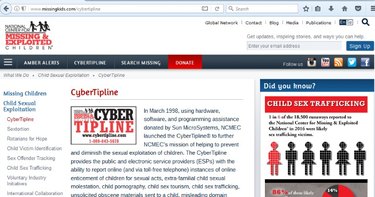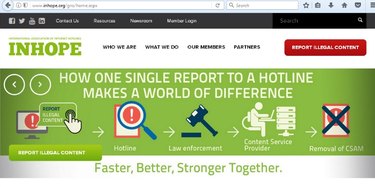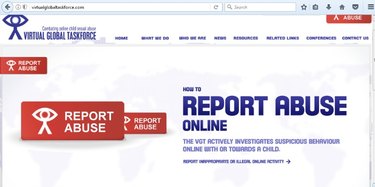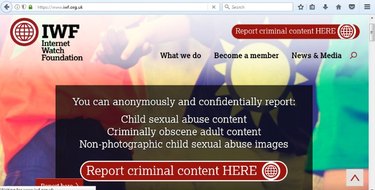The internet is a huge and sometimes scary place. To be sure, there's content on the web that you wouldn't want your kids to see. But moreover, some of those web pages might be illegal, too. The good news is that you can report websites that might be breaking the law--not just to your local police department, but directly to any of several national and international agencies specializing in this area.
We've rounded up what you need to know to quickly and easily report questionable content to four of these agencies: Cyber Tipline; INHOPE; Virtual Global Taskforce (VGTF); and the Internet Watch Foundation (IWF).
Video of the Day
Who knows? A report you make might lead to a criminally offensive web page to be taken down or even lead to some perpetrator's arrest.
Cyber Tipline
On its help pages, <ahref="https: www.google.com="" "=""> </ahref="https:>Google provides contact info on where to report online images of child abuse for residents of various countries throughout the world. For US residents, Google suggests contacting the National Council for Missing & Exploited Children (NCMEC).

While the NCMEC is well known for its missing children hotline, the group also runs its Cyber Tipline as a way of furthering its missions of preventing sexual exploitation of children and reducing what it calls the "proliferation of child abuse images online."
Since its establishment in 1998, Cyber Tipline has already received more than 12.7 million reports of suspected child sexual exploitation from members of the public and electronic service providers (ESPs).
Reports can include instances of child porn, online enticement of children, and misleading domain names, for example.
You can make a report to Cyber Tipline directly on the NCMEC site or by calling 800-843-5678.
NCMEC continuously monitors Cyber Tipline to make sure that kids who might be in imminent danger get top priority. After NCMEC completes its reviews, the reports are made available to all law enforcement agencies.
INHOPE
INHOPE is a collaboration of 46 hotlines in 40 countries worldwide, including the US, Canda, Mexico, Brazil, the Russian Federation, Australia, and many European nations.

You can make reports directly on the site about illegal activities such as child porn, "grooming,'" and online hate messages against racial, ethnic, and religious groups.
What's grooming, you ask? Honestly, you'd probably prefer not to know this, but in grooming, pedophiles visit social network sites and other chat rooms, often disguising themselves as other children or teens, to "befriend" and make emotional connections with kids they hope to exploit later.
INHOPE is in contact with international law enforcement agencies such as Interpol, Europol, and the VGTF, which in turn work with content service providers (CSPs) in countries where illegal content is being hosted on websites.
Even if you live in the US, this could be a good group to contact if you come across any hate sites online, or if you have evidence that any of your kids has been stalked by an online predator.
INHOPE's partner organizations include Google, Facebook, Twitter, Microsoft, Internet security software firm Trend Micro, and Crisp, a team of social networking analysts.
INHOPE is quite publicly active on Twitter, where the group currently has almost 8,000 followers.
VGTF
The VGTF, an international consortium of law enforcement agencies aimed at curbing online child abuse, is another resource at your disposal. The site has its own reporting page you can use.

Members include Interpol and Europol, along with national police agencies in the US, Canada, UK, Colombia, Australia, New Zealand, The Netherlands, Switzerland, the Philippines, the Republic of Korea, and the United Arab Emirates (UAE).
In December of 2016, the VGTF announced the arrest of 20 alleged offenders as initial results of a six-month initiative called "Operation Global."
IWF
The IWF, for its part, focuses on removing images of child sex abuse from the web. Although based in the UK, the organization works with law enforcement agencies and Internet companies worldwide in this regard.

You can use the site to report photos and videos of child sex abuse that might be hosted on web sites anywhere in the world.
You can also report criminally obscene adult content, but only if that content is hosted on web servers in the UK.
The IWF researches case law in various countries to help determine the legality of content.
The not-for-profit also provides a wide range of technical services to web hosting, social networking, and other member companies to help them remove illegal child sex abuse content.
These services include an image hash list, based on Microsoft's PhotoDNA technology, designed to prevent Internet users from uploading, storing, or hosting this type of inappropriate content.
